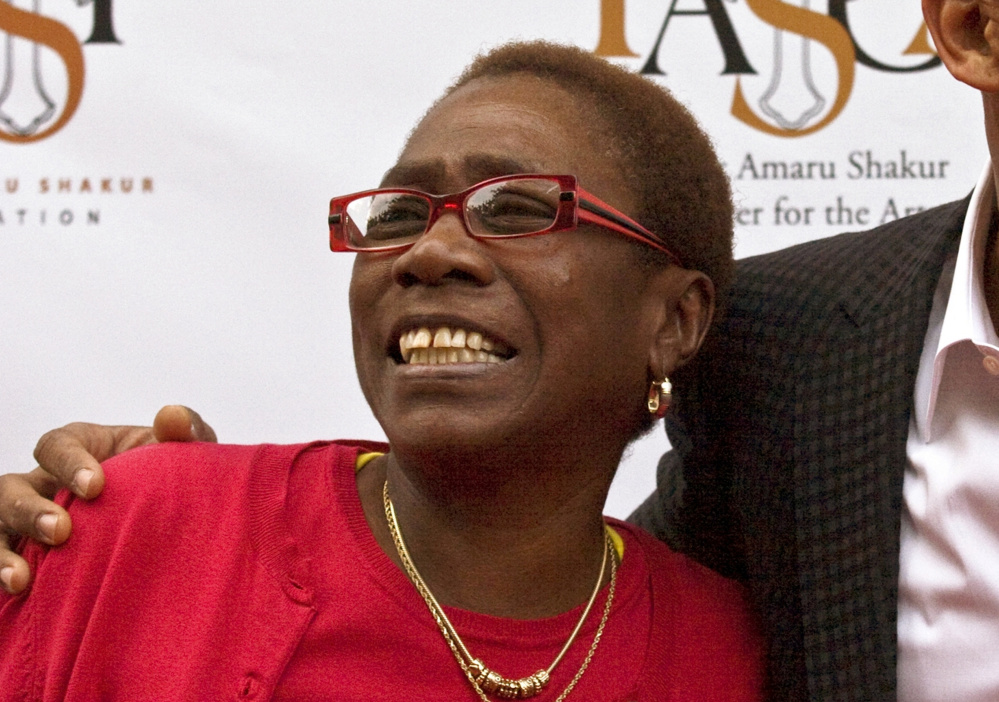Afeni Shakur, a onetime Black Panther who guarded the legacy of her son, the perennially popular and controversial “gangsta” rapper Tupac Shakur, after his drive-by shooting death in 1996, died May 2 at a hospital near her home in Sausalito, California. She was 69.
Her death was announced by the Marin County Sheriff’s Office, which said deputies responded to her home for a report of possible cardiac arrest. A coroner will determine the cause of death.
Shakur gave birth to her son in 1971, a month after she and a dozen other members of the Black Panther black nationalist group were acquitted in New York on charges of conspiring to kill police officers and bomb police stations and department stores. She had spent a portion of her pregnancy in jail and represented herself in the high-profile legal proceedings that carried her briefly to national attention.
After the trial, Shakur worked as a paralegal before descending into drug addiction. Drugs brought her to “the pit of the garbage can,” she once told The Washington Post, “underneath the corroded bottom of the garbage can, where only the maggots live.”
She raised Tupac and his half-sister, Sekyiwa, in the Bronx, and then in Baltimore and Marin County, enrolling her son in arts schools and programs. The rapper recalled his upbringing in his 1995 platinum single “Dear Mama,” written while Shakur was undergoing treatment for drug addiction:
And even as a crack fiend, Mama
You always was a black queen, Mama
I finally understand
For a woman it ain’t easy trying to raise a man
You always was committed
A poor single mother on welfare, tell me how ya did it
There’s no way I can pay you back
But the plan is to show you that I understand
You are appreciated
The song was entered into the Library of Congress’s National Recording Registry and was described as a “moving and eloquent homage to both (Tupac Shakur’s) own mother and all mothers struggling to maintain a family in the face of addiction, poverty and societal indifference.”
Shakur said that the song had “done wonders for me and my spirit.”
“Now that my son seems to be able to deal with those things and bring them to the light, it helps me face them,” she told the Atlanta Journal-Constitution in 1995. “Deal with that ugliness. And move toward some peace.”
Tupac Shakur, who also acted in films including “Poetic Justice” (1993), was widely regarded as a brilliant musician, but he provoked a firestorm with lyrics that to some listeners seemed to glorify violence. The rapper was convicted of sexually abusing a female fan and, in a separate incident, of assault and battery. He tattooed the phrase “thug life” across his abdomen.
He survived a shooting in 1993 before he was fired upon in his BMW in Las Vegas in 1996. He died six days later, at age 25. The crime remains unsolved.
After her son’s death, Shakur fought an extended legal battle over the rights to his unreleased recordings. She became chief executive of Amaru Entertainment/Amaru Records, which released albums of her son’s music including “R U Still Down? (Remember Me)” (1997) and “Loyal to the Game” (2004). She was the executive producer of the documentary “Tupac: Resurrection” (2003).
For a period, Shakur also ran the Tupac Amaru Shakur Foundation in Georgia.
Shakur was born Alice Faye Williams in Lumberton, North Carolina, on Jan. 10, 1947. She grew up in New York, where she took the name Afeni Shakur around the time that she joined the Black Panther movement. She traced her activism to the horror of seeing photographs of the lifeless body of Emmett Till, the young black man lynched in Mississippi in 1955 for allegedly whistling at a white woman.
Shakur became pregnant with her son while on bail in the conspiracy trial. She never revealed the identity of the father, Newsday reported in 1993. She named her baby after the Incan ruler Tupac Amaru.
She was married several times, most recently to Gust Davis. They were divorced. A complete list of survivors was not immediately available.
Shakur was the subject of a biography, “Afeni Shakur: Evolution of a Revolutionary” (2004), by actress Jasmine Guy.
In an interview with the Ottawa Citizen, Shakur once reflected on questions about the presence of violence in her son’s music.
“I think we are in denial about our own violence when we look at the rap community and say, ‘That’s where the violence is,’ ” she said. “Violence. Is there any place we can go right now where there isn’t any? I’d love to be there.”
Copy the Story LinkSend questions/comments to the editors.



Success. Please wait for the page to reload. If the page does not reload within 5 seconds, please refresh the page.
Enter your email and password to access comments.
Hi, to comment on stories you must . This profile is in addition to your subscription and website login.
Already have a commenting profile? .
Invalid username/password.
Please check your email to confirm and complete your registration.
Only subscribers are eligible to post comments. Please subscribe or login first for digital access. Here’s why.
Use the form below to reset your password. When you've submitted your account email, we will send an email with a reset code.